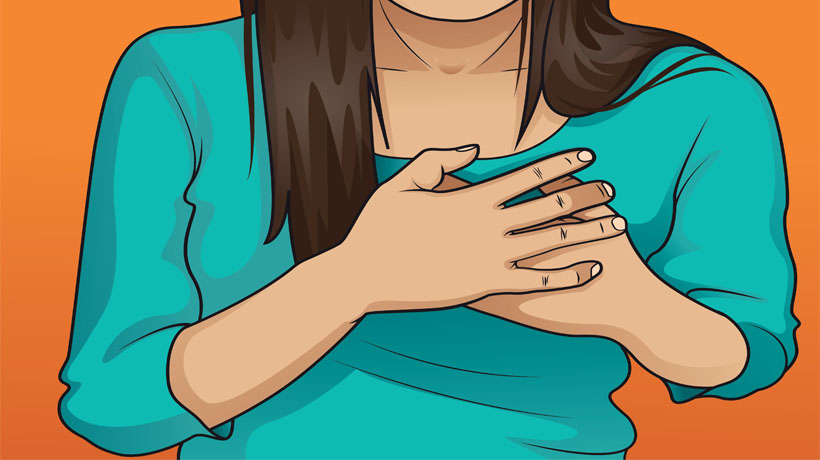Chest pain isn’t fun— it can strike out of nowhere and, unless you know you have a certain condition which triggers attacks, it can be difficult to pinpoint a cause. According to the Mayo Clinic, chest pains can appear in many forms and at various degrees of intensity: Sometimes it can feel like a light ache, and other times it can feel like a knife has been lodged between your ribs.
Fortunately, chest pains don’t always point to a serious problem. Here’s a list of five unusual things that may cause chest pain and tightness, ranging in severity. However, it’s important to remember that chest pain can indicate a life-threatening problem; if you experience chest pain or tightness, seek help immediately.
Gastroesophageal reflux disease (GERD)
According to the Mayo Clinic, gastroesophageal reflux disease (GERD) is a condition where acid from your stomach rises up into your esophagus, or the tube connecting your mouth and stomach. When this happens, the lining of your esophagus becomes irritated, and you may experience chest pain.
Most people experience the occasional acid reflux. However, if you have GERD, you might suffer from mild to moderate symptoms up to twice a week. Besides chest pains, other common signs of GERD include heartburn, difficulty swallowing, regurgitation of foods or sour liquids, and the sensation of a lump in your throat. Severe symptoms should warrant a trip to your healthcare professional as certain medications can be prescribed to ease the discomfort.
Asthma
We know asthma causes irritation in the lungs — but did you know it might be the root of your chest pain, too? If you have asthma, your airways narrow and accumulate extra mucus. This constriction makes breathing difficult and might trigger coughing, wheezing, shortness of breath … and chest pain.
Some people with asthma experience worse or more frequent symptoms than others. While it can’t be cured, it can be controlled. If you think your symptoms might be worsening, be sure to seek immediate help if you need emergency treatment.
Panic attacks
If you suffer from anxiety, your panic attacks might be the cause of your chest pain. According to the Anxiety and Depression Association of America, a panic attack is the sudden onset of intense fear or discomfort. It peaks within minutes, and when it does, it might be accompanied by physical symptoms, such as an accelerated heart rate, sweating, trembling and chest pain.
It’s essential to remember that panic attacks are very real, and deserve serious attention. They might hit out of nowhere and can be very frightening — particularly if you aren’t properly diagnosed. If you think you might be suffering from panic attacks, discuss your symptoms – and available treatments -with your healthcare professional.
Shingles
If you’ve ever had chicken pox in the past, you may be at risk for developing shingles … and it might trigger chest pain. According to the Mayo Clinic, shingles is caused by a reactivation of the varicella-zoster virus., the same virus that caused your chicken pox. The infection resurfaces as a painful rash, usually as a stripe of blisters that wraps around one side of your torso.
Though shingles isn’t life-threatening, it can be very uncomfortable. Along with a visible rash and chest pain, you might feel itching and a tingling or burning sensation on your skin. Reach out to your healthcare professional if you suffered from chicken pox and are experiencing symptoms of the infection.
Pulmonary hypertension
If you have pulmonary hypertension, you suffer a kind of high blood pressure which affects the arteries in your lungs and the right side of your heart. In this condition, the tiny arteries in your lungs become narrowed or blocked, making it difficult for blood to flow through them. Unlike some of the less serious causes of chest pains, pulmonary hypertension can be life-threatening — and might become progressively worse. Other common symptoms include shortness of breath, fatigue and swelling in your ankles and legs. Your lips and skin might also take on a bluish color. While some forms of pulmonary hypertension aren’t curable, you can receive treatments to help reduce your symptoms.
Sources:
https://www.mayoclinic.org/diseases-conditions/chest-pain/symptoms-causes/syc-20370838
https://www.mayoclinic.org/diseases-conditions/gerd/symptoms-causes/syc-20361940
https://www.mayoclinic.org/diseases-conditions/asthma/symptoms-causes/syc-20369653
https://adaa.org/understanding-anxiety/panic-disorder-agoraphobia/symptoms
https://www.mayoclinic.org/diseases-conditions/shingles/symptoms-causes/syc-20353054
https://www.mayoclinic.org/diseases-conditions/pulmonary-hypertension/symptoms-causes/syc-20350697



